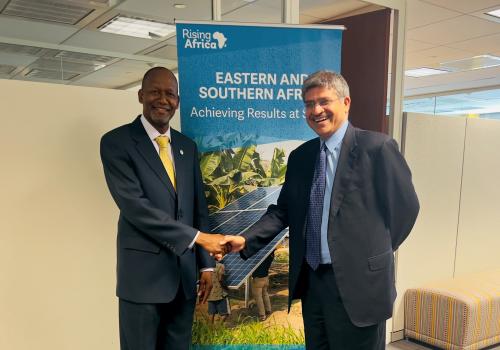On the margins of the Spring Meetings of the International Monetary Fund (IMF) and World Bank, the Executive Secretary of the Southern African Development Community (SADC), H.E. Mr. Elias Magosi, paid a courtesy call on Dr. Amit Dar, Acting Vice President for Eastern and Southern Africa, at the World Bank headquarters on 22 April 2025.
The meeting focused on reviewing the SADC-World Bank programme portfolio, assessing progress on previously agreed actions, and identifying new opportunities for collaboration to strengthen regional development efforts. H.E. Magosi reaffirmed SADC’s appreciation for the World Bank’s sustained collaboration and support for advancing regional integration.
Programme portfolio and key updates
The SADC-World Bank partnership currently comprises three key projects valued at US$19.6 million, following the closure of the Public Procurement Umbrella Monitoring and Evaluation Framework and Capacity Development Project in June 2024. H.E. Magosi emphasised the critical role of these projects in advancing SADC’s strategic goals for regional development and integration.
The Secretariat also provided updates on the Mid-Term Review (MTR) of the Regional Indicative Strategic Plan (RISDP 2020–2030). This strategic review is designed to evaluate progress, address emerging challenges, and recalibrate priorities to meet regional and global dynamics. The Secretariat committed to consulting with the World Bank throughout this process to ensure strategic alignment and impactful outcomes.
Pipeline projects
During the meeting, the Secretariat outlined plans for SMART Integrated Economic Corridors, a transformative initiative aimed at integrating infrastructure development and industrialisation within a multisectoral and multidimensional framework. The pilot programme will focus on the North-South Corridor and serve as a blueprint for replication across other key corridors in the region. Additionally, the Secretariat is undertaking a study on the top ten exports and imports in the SADC region, aimed at enhancing the regional comparative advantage and improving intra-trade.
In the energy sector, discussions highlighted the Regional Energy Transmission, Trade, and Decarbonisation Project (RETRADE), the successor to the Accelerating Regional Energy/Transformational Projects (AREP). Approved in January 2025 with an overall envelope of US$1.26 billion, RETRADE aims to enhance regional electricity trade, bolster climate resilience, and expand renewable energy capacity across Southern Africa.
The SADC ES commended the World Bank for the RETRADE-Zambia Project, which will interconnect the Southern and Eastern African Power Pools and strengthen Zambia’s energy infrastructure to support renewable energy initiatives and climate adaptation.
Collaborations and future engagement
H.E. Magosi also highlighted SADC’s collaboration with the World Bank on the One Health Initiative and a proposal for the Pandemic Fund, aimed at addressing regional health and climate challenges. These initiatives are being developed in partnership with the World Health Organisation (WHO), the Food and Agriculture Organisation (FAO), and other key stakeholders. Proposals are set for completion by June 2025.
Additionally, the ES discussed the Integrating Africa Forward Flagship Report, a World Bank-led initiative focused on capturing the status of regional integration and generating actionable policy solutions to existing challenges. SADC reaffirmed its commitment to contributing to the report and actively participating in all scheduled consultation sessions. The ES further urged the Bank to align with other established AU-led reporting initiatives, to avoid duplication of efforts and maximise synergies and complementarity.
Strengthened partnership
The World Bank reaffirmed its commitment to operationalising its formal engagement platform with SADC, including annual visits to the Secretariat in Botswana. However, roll-out of this platform will commence once the new Director for Regional Integration assumes office.
This high-level courtesy meeting underscored the strong partnership between SADC and the World Bank, reflecting their shared commitment to advancing regional development, economic integration, and sustainable growth.
The Executive Secretary was accompanied by Mr. Dennis Rweyemamu, Acting Director for Policy Planning and Resource Mobilisation, Ms. Barbara Lopi, Head of Communications and Public Relations, Dr. Mario Lironel, Senior Programme Officer for Finance and Investment, Mr. Calicious Tutalife, Senior Programme Officer for Value Chains, Engineer Edvan Moyo, Programme Officer for Energy, Mr. Thokozani Mlotsa, Resource Mobilisation Officer, and Ms. Kelejwang Moichubedi, Executive Assistant to the Executive Secretary.

